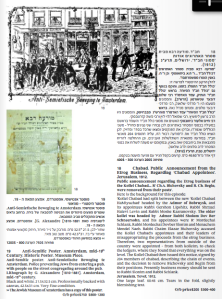Jul 6, 2020: Pope Francis’ Secretary for Relations with States, Archbishop Paul Gallagher dialogued with Rabbi David Rosen, a successor to Rabbi Abraham Heschel as representative of Jacob Schiff’s American Jewish Committee (AJC) to the Vatican. You may recall R. Heschel’s candid admission that the intent behind his dialogue with the Vatican was, “I want to attack their [ie. Catholics’] souls.” The dialogue under present consideration is a continuation of that mission. The discussion was live streamed. The video is embedded below.
The host for the discussion was the AJC’s Lisa Palmieri-Billig, who previously worked for the ADL of B’nai B’rth lodge, and before that worked in the Rome office of the World Jewish Congress (WJC) during the Vatican II Council which was headed by Nahum Goldmann at that time.
We should note at the outset, R. Rosen wonders if the Vatican’s ‘foreign minister’ has ever met with a Jewish organization before, which begs the question, why has it happened now? Whatever the reason, it does reflect the reality that the AJC, like so many other Jewish power organizations, is an agent of the Israeli government. Indeed, Palmieri-Billig begins by stating the intent to discuss the relationship between the Holy See and ‘Israel’ and identifies R. Rosen as an “Israeli.”
In her introduction, Palmieri-Billig draws attention to the ‘Israel’- Vatican bilateral commission (which in 2007 recognized the talmudic ‘Noahide laws’ and outrageously, anachronistically suggested that these ‘Noahide laws’ are “reflected” in the New Testament Book of Acts).
Palmieri-Billig then sets up her tag partner R. Rosen by citing the 1993 Fundamental Agreement between the Holy See and the State of Israel, and specifically Article 2 of the preamble which commits the Holy See to become a force multiplier of AJC/ADL-type Jewish power groups in “combatting all forms of antisemitism”.
After a brief thanks, R. Rosen, a self-described Pharisee, gets straight to business picking up the baton Palmieri-Billig had earlier passed to beat the Church (@11:30). R. Rosen reminds the Holy See that it has signed a contract with Counterfeit Israel to “work together in joint action to combat antisemitism” and R. Rosen expects that pound of flesh, which he suggests has not even begun to be paid yet. Naturally, Rosen has suggestions (as his posture becomes more aggressive): The Church’s network of nuncios should be networking with Jewish power groups at the local level and organizing programs. They haven’t done so thus far. They need to DO MORE; do programs “to raise the problem of antisemitism and anti-Judaism… be active in changing attitudes,” in other words, be an extension of Jacob Schiff’s anti-Christ American Jewish Committee.
Abp. Gallagher is now sinking in posture, whether due to Rosen’s overbearing performance, exasperation that clerics are already servants to Jewish power groups, God knows. He attempts to redeem at least himself with a litany of his own disgraceful philorabbinic treacheries with the synagogues; wearing a yarmulke, etc. etc. Abp. Gallagher agrees that, yes, the Church can and should do more. This softens the edge of the tag team’s sterness, but not for long.
Palmieri-Billig wants to know why the Vatican has not yet accepted the International Holocaust Remembrance Alliance’s ‘working definition of antisemitism.’ Abp. Gallagher believes that defining ‘antisemitism’ may be counterproductive. R. Rosen laments the difficulties that Jew-supremacist groups are having smearing the people they hate as ‘antisemites.’ There needs to be a definition in order to prosecute ‘antisemites.’ A definition would allow them to “legislate punitive actions … legal penalties.” ‘A definition allows you to address conspiracy theories,’ a definition would facilitate stigmatization of ‘antisemites’ to prevent stigmatization of Jews.
Palmieri-Billig asks what else the Church will do towards “reconciliation” between the Church and Counterfeit Israel. Abp. Gallagher says there are many [Catholics] who don’t embrace completely the formal position of the Church [wrt ‘antisemitism’] so we need to work on that. Gallagher suggests a revival of Nostra Aetate, the Vatican II document co-written by R. Rosen’s AJC predecessor, R. Abraham “I want to attack their [ie. Catholics’] souls” Heschel. Perhaps some aspects of this document have been neglected he says.
R. Rosen notes the “amazing, blessed transformation” of the [Novus Ordo] magisterium “of the popes and official documents of the Church,” but laments that it hasn’t worked its way to the grass roots. The biggest problem for R. Rosen is that of formation. If the Church is serious about these contracts it has signed with Counterfeit Israel then it [ie. “Jewish roots” and by this Rosen means broadly, pharisaic, talmudic Orthodox Jewish roots] needs to be an essential part of the formation of priests, everywhere. and he “fears” this is not the case. There should be a greater and deeper knowledge of [modern] ‘Jews,’ [rabbinic] Judaism and [Counterfeit] Israel.
Abp. Gallagher is sinking again, but tries to win some approval by reminding the AJC tag team how philojudaic the past few popes have been while agreeing that “obviously” there is much work to be done “obviously” at the grass roots with the education of young people and the formation of clergy and religious.
The discussion then turns to the status of Jerusalem. Palmieri-Billig asks R. Rosen to speak on the state of Christians in ‘Israel’ today rather than an, at least, ostensible representative of Christians. R. Rosen has proven himself to be a complete liar on this topic. I will not repeat his lies on behalf of the Ku Klux anti-Christ Jewish state. Anyone still interested can continue watching the softball Q&A in the video below.
https://web.archive.org/web/20221010114522if_/https://www.youtube.com/embed/oBGXeQ7JgTg





















